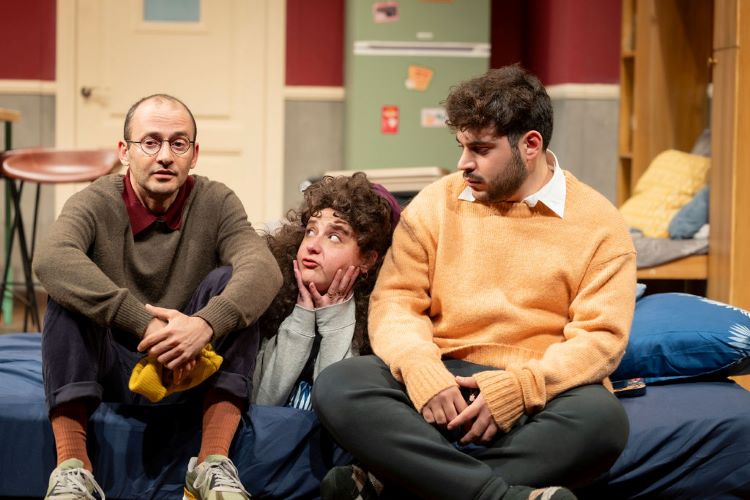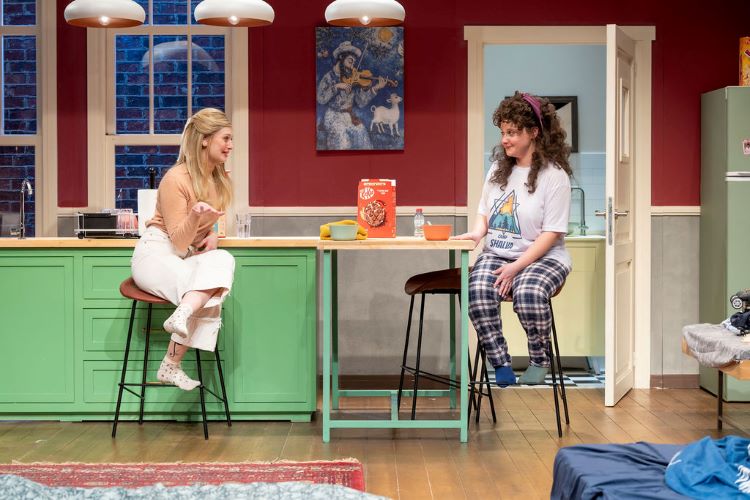
Shared grief can bring a family (or a nation) together, but sometimes pain and loss can pull people apart. The Khan Theatre production of Joshua Harmon’s provocatively titled Bad Jews, directed by Tamar Keenan, is a clever and hilarious exploration of the tensions that rise to the surface following the funeral of a beloved grandfather. Harmon’s play premiered in 2012, yet over a decade later, the issues it raises remain not only relevant, but critical. What does it mean to be “a good Jew” or “a bad Jew”? Who gets to decide? Is there more than one way to be Jewish, to relate to religion and culture? And – while not a central part of the play but prominent on the contemporary cultural-political scene – what about Israel?
The play is set in New York and focuses on the grandchildren in an American Jewish family. Yet from the audience response to the performance in Tel Aviv, the questions it raises are as relevant, and evoke strong feelings among Israeli Jews as well. As the play begins, Daphna (Carmel Netzer), a college senior with a strong connection to family and heritage, is staying with her cousin Jonah (Gal Zak) at the studio apartment his parents bought for Jonah and his older brother Liam (Itay Szor), who is pursuing a Ph.D. in Asian studies. Carmel Netzer delivers an energetic and intense performance as Daphna – she can’t stop talking, or criticizing, everything in sight, her intrusive personality knows no boundaries. Zak as Jonah, retreats into his phone, and wants nothing more than to be left alone in his grief, taking no side. The most immediate issue is inheritance – Poppy (“Papush” in the Hebrew translation) had a gold Chai which has emotional and symbolic value for Liam as well as Daphna.
Differences in economic status as well as cultural connection and religious observance have eroded the relationship between the cousins, who were, perhaps, closer in childhood. The competition for Poppy’s “Chai” heightens their grievances and animosity – all expressed in fast-paced barbs and pointed verbal attacks. Director Tamar Keenan successfully maintains the difficult balancing act between the humorous satire and the sincere, vulnerable aspects of the play. The experience of grieving the loss of a beloved grandfather is so painful, and the issues raised regarding Judaism are so charged, that the clever banter, exaggerated characters, and physical humor provide welcome respite. And it all comes to a spectacular, hilarious, climax.

Much as I enjoyed the performance, I also felt that Harmon’s play, while I believe was intended to present different perspectives in a way that was simultaneously provocative, yet validating and respectful, falls somewhat short of that intention. There is an inherent sexism and misogyny in the characters of Daphna and Melody. Blond, beautiful, kind, and kind of dumb, Melody’s character fits a certain stereotype, while Daphna – smart, talkative, intrusive, and abundantly hairy, fits another. It contributes to humor, perhaps, but it also detracts from the more meaningful aspect of the play.
If Daphna and Liam present two different and conflicting perspectives on being a Jew today, then the extent to which the text presents Daphna as relentlessly mean, and ultimately, judges her, distorts the intended impartial stance of the play. And yet – overall, I think the play is successful in presenting a critical look at the different perspectives, and the proof is in the audience response. When I attended the play there was a strong audience response on two occasions: once when Daphna criticized Liam for rejecting his cultural heritage, and once when Liam defended his right to love whomever he chooses. While it’s possible that one round of applause was “team Daphna” and the other was “team Liam,” I prefer to interpret the response of the audience as revealing our ability to relate to issues of Judaism in a complex manner.
Bad Jews
By Joshua Harmon
Translation: Rivka Meshulach; Director: Tamar Keenan; Set Design: Orna Behrendt Shimony; Costume Design: Or Wainman; Lighting Design: Matan Preminger; Fight Choreography: Liran Mizrahi; Production Manager: Keren Or Gadon; Assistant Director: Daniel Bagno; Cast: Carmel Netzer, Anna Pugatch, Itay Szor, Gal Zak





